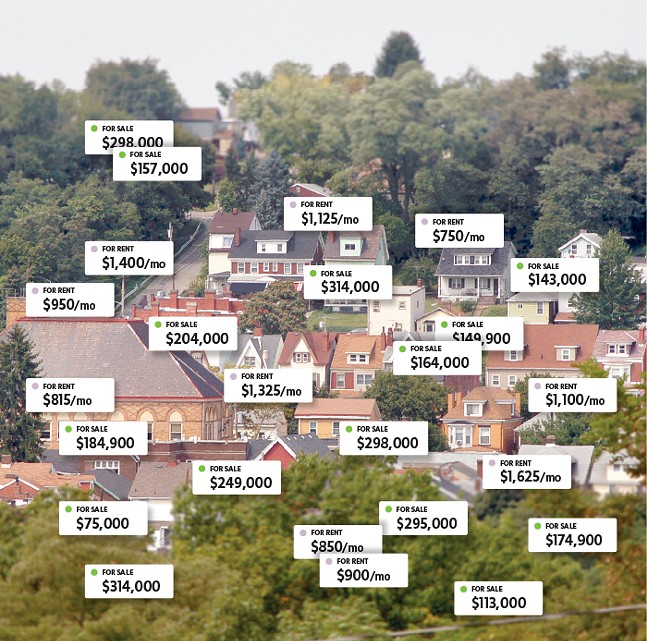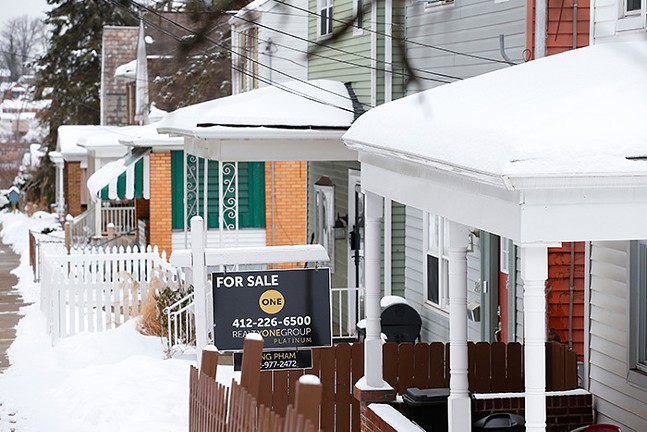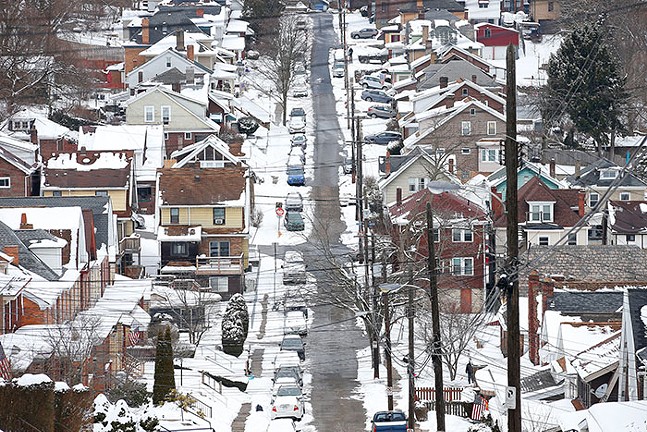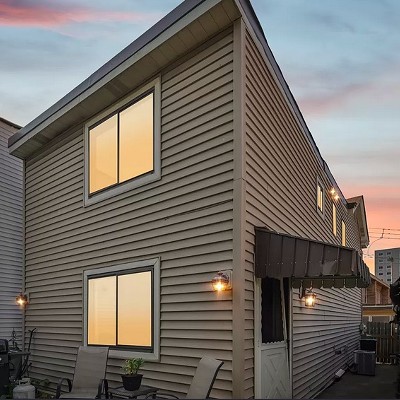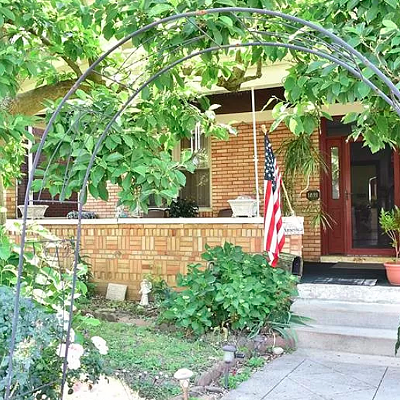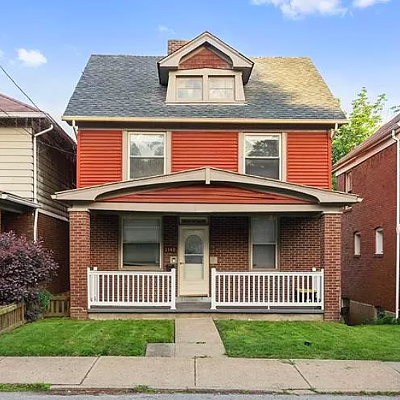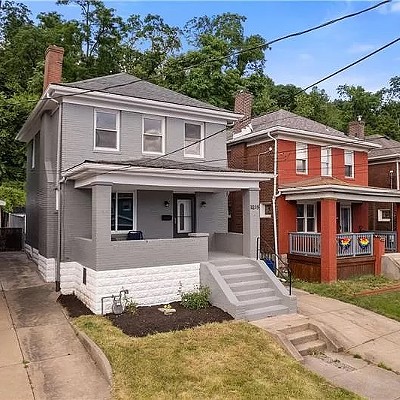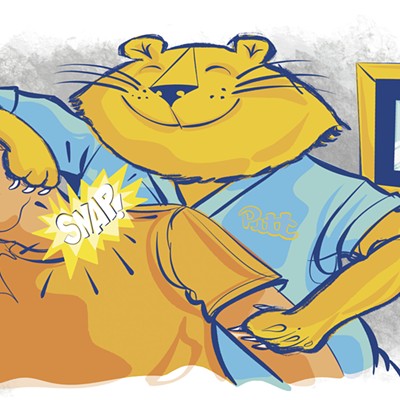How the pandemic has shifted Pittsburgh’s housing market
[
{
"name": "Local Action Unit",
"component": "24929589",
"insertPoint": "3",
"requiredCountToDisplay": "1"
}
]
The coronavirus pandemic has done some unusual things to housing markets across the country. In high-rent cities like San Francisco and New York, rental prices have dropped significantly, seemingly caused by wealthy renters decamping from the city to live in or purchase homes in more remote locations, since they are now working remotely.
At the same time, many home-buying markets are booming. According to brokerage firm Redfin, home prices in urban markets throughout the country increased by 15% from November 2020 to January 2021. This increase is slightly ahead of suburban home buying markets in America. Former renters could be spurred on by the pandemic and low-interest rates to finally buy a home, even if it means staying in the city.
So where does Pittsburgh stand in this pandemic housing market?
According to a report from apartment search site Apartment List, Pittsburgh rents in January 2021 have decreased by an average of 5.7% compared to January 2020 rents. That’s still far below the rental drop pace of high-price cities like Washington, D.C. or San Francisco — which saw a 27% decrease year-over-year — but Pittsburgh’s rental drop is faster than comparable Rust Belt cities, many of which actually saw year-over-year increases in rent.
This isn’t to say that Pittsburgh is more affordable now compared to other Rust Belt cities, as its January 2021 average rent for a one-bedroom unit is $846, placing it among the most expensive compared to cities like St. Louis, Cincinnati, or Detroit, according to Apartment List.
On the flip side, demand for purchasing homes in Pittsburgh has been up during the last year, according to local RE/MAX Realtor Tim Gyves.
“This summer was extremely competitive for folks,” says Gyves, who saw a noticeable increase in business after COVID-19 restrictions were lifted for real estate agents. “I had clients that were outbid by three to four other people in a row for some homes. … Last year was the busiest year I have ever had, which is strange, but I think a lot of other agents would say the same.”
The drop in rent prices and rise in the home buying market could spell a shift in behavior for Pittsburgh residents and new arrivals. Gyves thinks the market is showing signs of something regional leaders have been predicting and/or desiring for some time: Pittsburgh’s relatively cheap home prices are keeping people in Pittsburgh and attracting others from outside of the region.
“It is never gonna be apples to apples,” says Gyves of comparing Pittsburgh to other cities. “We do have a fair amount of industry crossover ways, with our tech center. You sort of get folks who are moving where people can do the same job as those other cities. It makes sense for them to buy. They never had a chance in [Silicon Valley], but here they might.”
Whether that trend holds is uncertain, but for now, it appears the pandemic might be contributing to it.
According to a recent Bloomberg article, Pittsburgh may be seeing some demand for its neighborhoods that contain amenities attractive to urban residents. According to Redfin, housing prices in the city of Pittsburgh are up about 20% since last year and are currently averaging $202,000. And the city’s housing market is even slightly more competitive than traditionally popular suburbs and exurbs like Mt. Lebanon and Murrysville.
“Buyers in the city have to be ready to go — they can’t pause,” Kelly Hanna Riley, of Howard Hanna Real Estate Services, told Bloomberg in February. “They have to know they might go over asking price.”
In Pittsburgh, Gyves says he has seen a mix of buyers interested in the suburbs and the city, with a strong focus on “first-ring” suburbs that offer a mix of suburbia and urban amenities, like coffee shops and restaurants that are within walking distance for residents. Redfin’s housing market index has first-ring suburbs like Dormont and Bellevue among the most competitive housing markets in the region.
Gyves believes increased demand in first-ring suburbs and city neighborhoods is a mix of the pandemic and historically low interest rates. Both involve many renters who are either looking for a little more space for quarantining, or people who are finally ready to make the home-buying plunge knowing they are getting a relatively good deal with low-interest rates on mortgages. Pittsburgh’s share of mortgage payments to income is at 11%, which is relatively low compared to other cities, according to real-estate website Point2.
“Some people are wanting space, whether because of kids or a person working from home. They might need more room,” says Gyves. “Some people are moving here and buying in the city to take advantage of the amenities that will be back when the pandemic ends.”
But this hot housing market comes with consequences. Gyves said home prices in some Pittsburgh neighborhoods are appreciating fast, and getting out of reach for some home buyers.
And renters are affected, too. Before Pittsburgh saw rents drop in 2020, it saw a significant jump in rents of 4.3% in 2019, according to Apartment List. This increase might have pushed those with the means to purchase homes, which could have helped to drive down rent in the short term. Rental supply temporarily increases, but those without the means are stuck with increased rent in popular areas. These forces are contributing to gentrification in some city neighborhoods, which is forcing some lower-income residents out of desirable urban areas.
In the end, Gyves says Pittsburgh’s housing market had a very interesting year under the pandemic but cautioned against assuming these trends are set in stone.
“It is hard to say if this is a permanent shift because everyone is adjusting to the pandemic,” says Gyves. “There is still a mix of pent up demand, of people moving here, and people interested in staying, but then still some long-time natives that might not want to sell their home due to uncertainty related to the pandemic.
At the same time, many home-buying markets are booming. According to brokerage firm Redfin, home prices in urban markets throughout the country increased by 15% from November 2020 to January 2021. This increase is slightly ahead of suburban home buying markets in America. Former renters could be spurred on by the pandemic and low-interest rates to finally buy a home, even if it means staying in the city.
So where does Pittsburgh stand in this pandemic housing market?
According to a report from apartment search site Apartment List, Pittsburgh rents in January 2021 have decreased by an average of 5.7% compared to January 2020 rents. That’s still far below the rental drop pace of high-price cities like Washington, D.C. or San Francisco — which saw a 27% decrease year-over-year — but Pittsburgh’s rental drop is faster than comparable Rust Belt cities, many of which actually saw year-over-year increases in rent.
This isn’t to say that Pittsburgh is more affordable now compared to other Rust Belt cities, as its January 2021 average rent for a one-bedroom unit is $846, placing it among the most expensive compared to cities like St. Louis, Cincinnati, or Detroit, according to Apartment List.
On the flip side, demand for purchasing homes in Pittsburgh has been up during the last year, according to local RE/MAX Realtor Tim Gyves.
“This summer was extremely competitive for folks,” says Gyves, who saw a noticeable increase in business after COVID-19 restrictions were lifted for real estate agents. “I had clients that were outbid by three to four other people in a row for some homes. … Last year was the busiest year I have ever had, which is strange, but I think a lot of other agents would say the same.”
The drop in rent prices and rise in the home buying market could spell a shift in behavior for Pittsburgh residents and new arrivals. Gyves thinks the market is showing signs of something regional leaders have been predicting and/or desiring for some time: Pittsburgh’s relatively cheap home prices are keeping people in Pittsburgh and attracting others from outside of the region.
“It is never gonna be apples to apples,” says Gyves of comparing Pittsburgh to other cities. “We do have a fair amount of industry crossover ways, with our tech center. You sort of get folks who are moving where people can do the same job as those other cities. It makes sense for them to buy. They never had a chance in [Silicon Valley], but here they might.”
Whether that trend holds is uncertain, but for now, it appears the pandemic might be contributing to it.
According to a recent Bloomberg article, Pittsburgh may be seeing some demand for its neighborhoods that contain amenities attractive to urban residents. According to Redfin, housing prices in the city of Pittsburgh are up about 20% since last year and are currently averaging $202,000. And the city’s housing market is even slightly more competitive than traditionally popular suburbs and exurbs like Mt. Lebanon and Murrysville.
“Buyers in the city have to be ready to go — they can’t pause,” Kelly Hanna Riley, of Howard Hanna Real Estate Services, told Bloomberg in February. “They have to know they might go over asking price.”
In Pittsburgh, Gyves says he has seen a mix of buyers interested in the suburbs and the city, with a strong focus on “first-ring” suburbs that offer a mix of suburbia and urban amenities, like coffee shops and restaurants that are within walking distance for residents. Redfin’s housing market index has first-ring suburbs like Dormont and Bellevue among the most competitive housing markets in the region.
Gyves believes increased demand in first-ring suburbs and city neighborhoods is a mix of the pandemic and historically low interest rates. Both involve many renters who are either looking for a little more space for quarantining, or people who are finally ready to make the home-buying plunge knowing they are getting a relatively good deal with low-interest rates on mortgages. Pittsburgh’s share of mortgage payments to income is at 11%, which is relatively low compared to other cities, according to real-estate website Point2.
“Some people are wanting space, whether because of kids or a person working from home. They might need more room,” says Gyves. “Some people are moving here and buying in the city to take advantage of the amenities that will be back when the pandemic ends.”
But this hot housing market comes with consequences. Gyves said home prices in some Pittsburgh neighborhoods are appreciating fast, and getting out of reach for some home buyers.
And renters are affected, too. Before Pittsburgh saw rents drop in 2020, it saw a significant jump in rents of 4.3% in 2019, according to Apartment List. This increase might have pushed those with the means to purchase homes, which could have helped to drive down rent in the short term. Rental supply temporarily increases, but those without the means are stuck with increased rent in popular areas. These forces are contributing to gentrification in some city neighborhoods, which is forcing some lower-income residents out of desirable urban areas.
In the end, Gyves says Pittsburgh’s housing market had a very interesting year under the pandemic but cautioned against assuming these trends are set in stone.
“It is hard to say if this is a permanent shift because everyone is adjusting to the pandemic,” says Gyves. “There is still a mix of pent up demand, of people moving here, and people interested in staying, but then still some long-time natives that might not want to sell their home due to uncertainty related to the pandemic.

